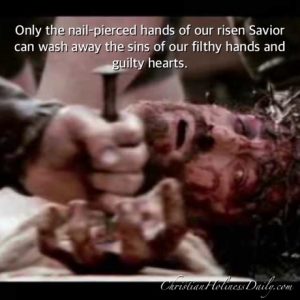
Take a look at your hands. How well do you know them? I can recall how I earned every scar. I know every freckle. I can tell you how I obtained a spot of pencil lead in my left palm in the second grade. Barely visible now, it is still there.
I know how hard my hands have worked and I know how they have betrayed my staunchest values in spite of my protests. My hands have did things in their younger days of which they should be dreadfully ashamed. I know, too, that my hands do not have a mind of their own. They are but a metaphor of the sin that flowed from my heart (before Christ delivered me from sin).
In Matthew 15, some Pharisees confront Jesus because His disciples did not ceremoniously wash their hands before eating. You see, the Pharisees were not merely pious observers of the Law of Moses. They had, for generation after generation, implemented laws of tradition – hundreds of oral laws – that governed every aspect of life both public and private. It is said that the Pharisees built fences around the Law of Moses that must be jumped to even dare break the written law.
Those oral traditions were considered as binding as the written law. One such law was that Jews must ritually wash their hands before eating.
Makes sense, after all. Jesus, the Creator of all life surely knew about the microscopic life that can live on our hands and make us ill if ingested. Of course, He did.
The Pharisees, though, were not concerned with the health of of Jesus and the disciples. They were concerned with power. They were attempting to slap Jesus down by catching Him in a sin.
Jesus, however, reminded the self-righteous Pharisees that it is not that which we pick up with our hands that condemns us. It is not that which rests in our stomachs that makes us “unclean,” but what rests in our hearts. Our hands do not condemn us, our hearts do.
I sometimes which I could wash away sin in a basin of water, like Pontius Pilate tried to do. During the trial of Jesus, Pilate, the Roman governor of Judea, found no reason to condemn the accused to death. He offered the mob an alternative, a rebel name Barabbas that he hoped would satisfy the agitated mob that cried for the death of Jesus. The mob, instead, asked for Barabbas to be freed and demanded Jesus be crucified. Pilate ordered Jesus flogged, hoping – perhaps – that beating Him within an inch of His life would quench the mob’s thirst for blood. It didn’t. Pilate conceded. He ceremoniously washed his hands of the conviction of Jesus, placed the blame on the mob, and turned over Jesus to be crucified.
The strongest soap and an over-abundance of water is unable to wash away the sins of our hands.
Only the pierced hands of Jesus can wash the stain of sins from our hands.
The Roman soldiers made Jesus lift and carry the patibulum, the thick horizontal part of the cross. The patibulum weighed over 75 pounds. It had a hole bored through it that allowed it to fit down over and secure it to the stipes (pronounced sty-peez). The beaten and exhausted Jesus would carry it as far as he could.
Moments later, they tied and then nailed the hands of Jesus to the patibulum. Two Roman soldiers lifted the cross bar with Jesus affixed to it, and sat the hollowed out part over the upright stipes. His feet were nailed to a small foot rest called the suppedaneum. There he would hang with His beaten back against a rough-hewn cross, His feet and hands pierced spikes. I weep when i think that His hands, bloodied and broken, are the same ones that freed me from the bondage to our sin.
Only the nail-pierced hands of our risen Savior can wash away the sins of our filthy hands and guilty hearts.
